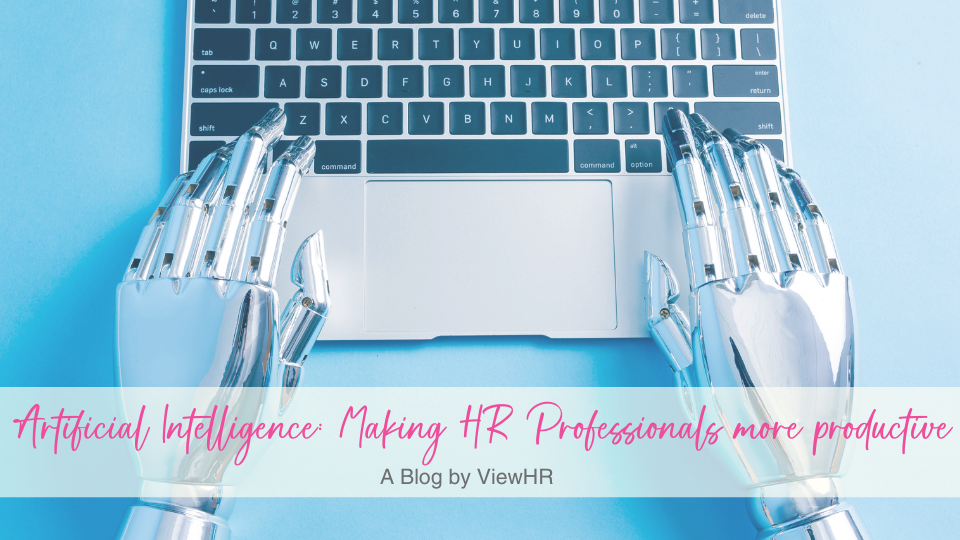Drop off your CV
We serve the global HR community through our offices located in Delhi, Hong Kong, London, New York, São Paulo and Singapore and have placed HR leaders in over 30 countries.
Artificial Intelligence or AI is technology that enables computers and machines to simulate ...

Artificial Intelligence or AI is technology that enables computers and machines to simulate human intelligence and problem-solving capabilities[1]. Sounds complex – and it is! AI is a complicated technology; but, over the years it has become far more accessible to the everyday user. In fact, the mobile phone you have in your pocket is probably running AI in the background for a number of features right this second.
Despite AI becoming more easily available, we may still shy away from using this fantastic technology. Maybe we don’t use it because there is still a perception that AI is out of reach, possibly we do not understand how we can use AI, or we hear news articles about AI being used to cheat[2].
In this blog we are going to consider how HR professionals can use AI to be more productive!
How can people professionals use AI? That is a good question, and the answer is broad – HR can use AI in the following areas:
In fact, there is the potential to use artificial intelligence in almost every aspect of HR practice. AI can aid and inform decision making, free up time, and can provide valuable insights.
Okay, you understand that AI can be used in HR, but how? Lets look at some specific use cases.
Candidate sourcing and hiring[3]: A common complaint about the hiring process is that it can be at times slow[4]; this in turn can mean the loss of good candidates. AI can help pick up the pace by helping managers nurture each potential hire automatically, and it allows them to receive notifications when a candidate applies for an open position. AI can help to shortlist candidates by reviewing application forms and CVs for relevant data while removing unconscious or conscious bias from the process.
Automating HR service[5]: Responding to employee needs is key to improving engagement and productivity, but navigating through policies and procedures can be time consuming. AI-powered HR chatbots can help empower employees with fast answers and self-service support. For instance, an employee would like to know how much paternity leave they are entitled to; the chatbot will find the answer by scanning through the correct policy and providing additional information such at notification notices.
Workforce Analytics[6]: Traditional workforce planning can be cumbersome at times, which may mean it is not done, or the process does not have the ability to adapt to quickly changing circumstances. HR professionals can use AI to seamlessly integrate real-time data on operational costs, human resources drivers, talent needs, and geographical factors. The AI software can enable instant insights into the impact on business objectives, cost implications, skills gaps, and talent acquisition challenges associated with various workforce scenarios. Having such data will allow for better decision making.
AI holds potential beyond major tasks, extending to smaller yet crucial functions like letter writing. For instance, a HR professional could employ AI to draft a grievance invite letter for an employee; although the output would require verification for accuracy, and compliance - it significantly lightens the workload. Similarly, when analysing staff survey results, leveraging an AI chatbot can yield detailed insights and recommendations. Moreover, by inputting a job description and person specification into AI systems, one can generate a polished job advert efficiently. These examples underscore how AI streamlines routine HR tasks, freeing up time for strategic initiatives.
While AI offers incredible benefits, it is important to remember the cybersecurity risks it brings[7]. Ensure that you are selective of the information you provide to public AI systems and ensure that it complies with GDPR legislation.
AI presents remarkable opportunities for HR professionals to streamline processes, save time, and gain valuable insights across various areas such as candidate sourcing, automating HR services, and workforce analytics. By leveraging AI in these aspects, HR teams can enhance productivity and decision-making.
[1] https://www.ibm.com/topics/artificial-intelligence
[2] https://schoolsweek.co.uk/ai-cheating-just-how-much-is-going-on-in-schools/#:~:text=JCQ%20has%20highlighted%20examples%20of,cheating%20and%20received%20zero%20marks.
[3] https://www.smartrecruiters.com/recruiting-software/artificial-intelligence-recruitment-tools/
[4] https://www.elevatus.io/blog/5-pitfalls-and-cost-of-slow-hiring-process/#:~:text=A%20slow%20hiring%20process%20can%20have%20serious%20consequences%2C%20from%20missed,job%20vacancy%20is%2036%20days!
[5] https://www.moveworks.com/us/en/solutions/hr-helpdesk?utm_source=adwords&utm_medium=cpc&utm_campaign=EMEA_Nonbrand_HR-Support&utm_term=chatbots%20for%20hr&utm_content=Demo-AI-Copilot&gad_source=1&gclid=Cj0KCQjw_qexBhCoARIsAFgBletBShAb1Ne0JbCriujfGUZ2z-juZRsfnH-N9UDDr2OysjXiS1tgZYcaAg0WEALw_wcB
[6] https://www.ibm.com/products/planning-analytics/workforce-planning?utm_content=SRCWW&p1=Search&p4=43700076424938806&p5=p&gad_source=1&gclid=Cj0KCQjw_qexBhCoARIsAFgBletJ0x0oZsDn-nzBv0p01TPlS2pDJb4Ip7Ixsq2TC0p68TG1MXmqj28aAheeEALw_wcB&gclsrc=aw.ds
[7] https://www.ncsc.gov.uk/guidance/ai-and-cyber-security-what-you-need-to-know#:~:text=it%20can%20be%20biased%20and,known%20as%20'data%20poisoning')